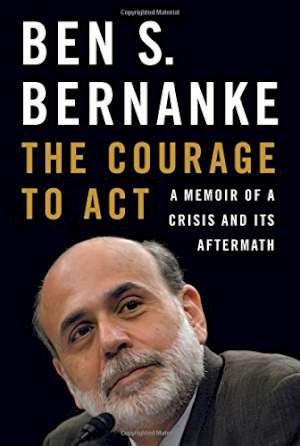01 February 2016
The Courage to Act
Ben Bernanke
2015, W.W. Norton & Co, 624 pages,
ISBN 9780393247213
Reviewer: Ian Harwood, Independent Consultant

Successive Federal Reserve Chairs have each, during the course of their respective tenures, been confronted with very considerable challenges. Arguably, though, the eight years Ben Bernanke spent at the helm from 2006 to 2014 saw the greatest challenge of the post-war years: preventing the implosion of the pre-2007 US bubble economy producing a 1930s-style global economic and financial meltdown; and, subsequently, deploying a series of ‘unconventional’ monetary measures in the endeavour of nursing a shell-shocked US economy back to health.
At present, of course, the jury is necessarily still out on how successful the prolonged zero rate regime and successive instalments of quantitative easing have been in laying the basis for a continuing healthy expansion, insofar as the Fed, led by Bernanke’s successor Janet Yellen, is only just beginning the process of monetary ‘normalisation’. So far, however, the US economy has experienced a sustained upswing from its mid-2009 cyclical low point and the labour market has progressively improved. Furthermore, the highly vocal inflationista critics of the adoption of ‘unconventional monetary policies have been proven wholly wrong.Bernanke had a ‘good’ crisis in 2007-09, insofar as he playing a pivotal and pro-active role in heading off a global banking crisis. Acutely aware of how the Fed had allowed the US banking system to collapse in the early 1930s, he was determined to ensure there was no repetition of this classic policy mistake. He was also painfully aware of the extent to which Japanese policy makers’ reluctance to properly mend a dysfunctional banking system had contributed to Japan’s ‘lost decade’. Hence, Bernanke was instrumental, in conjunction with Timothy Geithner, his Treasury counterpart, in ensuring that the US banking system was effectively re-capitalised in early 2009 and credible stress tests put in place.
Bernanke’s autobiography, The Courage to Act, devotes many of its pages to the tumultuous 2007/09 period, when the viability of the US economic system was most fatally threatened. And the subsequent recovery years are also extensively chronicled. Especially interesting and insightful, though, is Bernanke’s account of his formative years prior to succeeding Alan Greenspan as head of the Fed in January 2006 – both as an academic economist specialising in monetary analysis and history; and, subsequently, as a Fed Governor from 2002 onwards.
Greenspan, of course, seemed at the time a hard act to follow. Journalist Bob Woodward’s Maestro appellation had stuck and 2005 Jackson Hole conference saw Greenspan accorded the extra-ordinary accolade of, “Probably the world’s greatest ever central banker.” And subsequent developments – as Bernanke had increasingly to confront the excesses and imbalances created by the US housing market boom – caused his succession increasingly to resemble a hospital pass. Come the crunch of the banking crisis, however, and Bernanke excelled, marshalling his colleagues within the Fed to do whatever it took to prevent global meltdown while working in joined-up fashion with the White House and Treasury and securing the (reluctantly-given) support of Congress.
The Courage to Act is a well-written and highly readable book and can be recommended unreservedly. In particular, the narrative offers a wealth of useful insights into US monetary policy making as it evolved in response to a fast-developing systemic financial crisis – resulting eventually in the ‘crossing the Rubicon’ adoption of “unconventional” measures which had already been presciently outlined by Bernanke, when a fledgling Fed Governor, in his classic Deflation: Making Sure “It” Doesn’t Happen Here speech of November 2002 (which of course earned him the (unenviable) moniker of Helicopter Ben). As such, Bernanke’s book is an immensely useful addition to the rapidly expanding genre of post-crisis macro-economic literature relating, as it does, the personal story of one of the absolutely central players.
